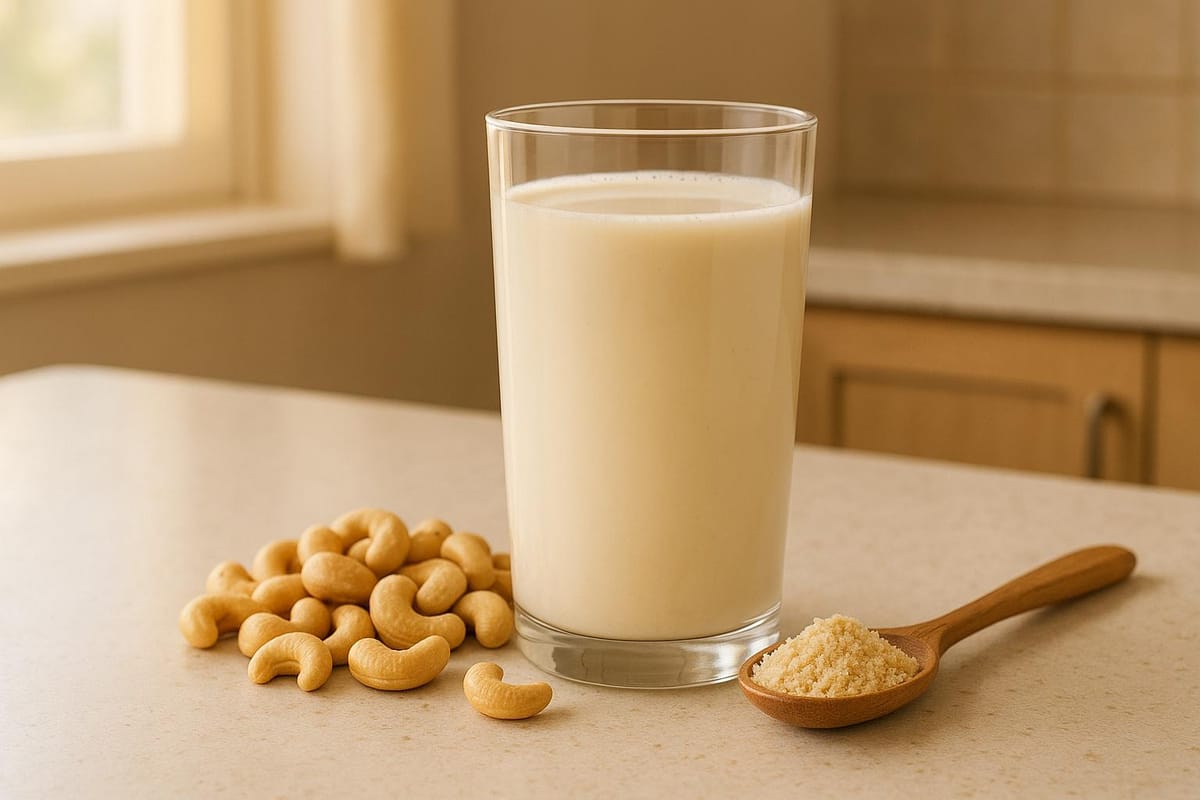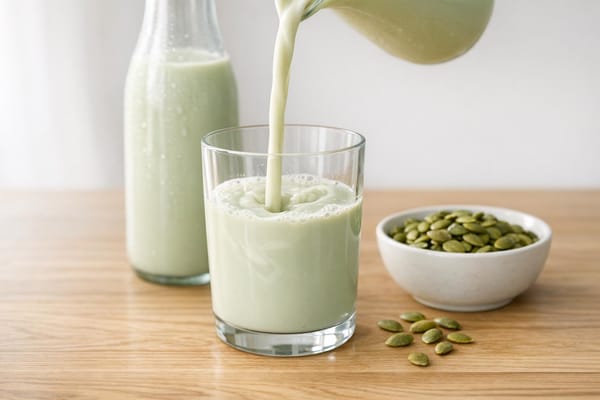Cashew Milk for Lactose Intolerance: Benefits
Explore the benefits of cashew milk for lactose intolerance, from its nutritional advantages to easy homemade recipes and enzyme support.

Struggling with lactose intolerance? Cashew milk is a simple, dairy-free alternative that’s easy to digest and packed with essential nutrients. It’s naturally lactose-free, enriched with calcium and vitamin D, and works well in coffee, smoothies, or recipes. Plus, it’s versatile - make it at home or grab a fortified store-bought option.
Quick Highlights:
- Lactose-free: No digestive discomfort.
- Nutrients: Fortified with calcium and vitamin D for bone health.
- Easy to use: Perfect for cereals, drinks, or cooking.
- Homemade or store-bought: Choose based on time and preference.
For occasional dairy cravings, enzyme supplements like milktab can help you enjoy dairy without the discomfort. Manage lactose intolerance with a balance of cashew milk and enzyme support for a comfortable, flexible lifestyle.
Lactose Intolerance: Symptoms and Diet Needs
Lactose Intolerance Basics
Lactose intolerance happens when your body doesn't produce enough lactase, the enzyme needed to break down lactose in dairy products. This condition affects millions of Americans and can cause bloating, gas, stomach cramps, nausea, and diarrhea after eating or drinking dairy.
Common Nutritional Deficits
Cutting out dairy from your diet can lead to lower intake of calcium and vitamin D - two nutrients crucial for strong bones, muscle function, nerve health, and immune support. For example, a single glass of milk contains about 300 mg of calcium and 100 IU of vitamin D.
To fill these nutritional gaps, there are plenty of options. Fortified dairy alternatives, like cashew milk, provide calcium and vitamin D without the lactose. Enzyme supplements, such as milktab's triple-enzyme formula (27,000 FCC lactase, 22,000 FCC protease, and 1,000 FCC lipase), can also help you digest dairy more comfortably.
Cashew Milk Benefits for Lactose-Free Diets
Naturally Free of Lactose
Cashew milk is an excellent choice for those avoiding lactose. It’s easy to enjoy in cereals, smoothies, or on its own - without the digestive issues that often come with dairy products. Plus, it fits seamlessly into a variety of meal plans.
Nutritional Highlights of Cashew Milk
Although cashew milk contains less protein than dairy milk, it still offers important nutrients. It’s a good source of healthy fats and minerals, making it a helpful addition to a balanced diet.
Fortified with Calcium and Vitamin D
Most store-bought cashew milk is enriched with calcium and vitamin D, making it closer nutritionally to dairy milk. These added nutrients are essential for maintaining strong bones and supporting overall health, making fortified cashew milk a smart pick for a lactose-free lifestyle.
Homemade Cashew Milk - No Straining! Zero Waste & Raw ...
Making vs. Buying Cashew Milk
Both homemade and store-bought cashew milk have their advantages. Your choice depends on your schedule, taste preferences, and dietary needs. Here's a quick guide to help you decide.
How to Make Cashew Milk at Home
This recipe is quick and makes about 4 cups of fresh cashew milk:
- Soak 1 cup of raw cashews in water for 4–6 hours.
- Drain and rinse the cashews thoroughly.
- Blend the soaked cashews with 4 cups of filtered water.
- Strain the mixture using a nut milk bag if you prefer a smoother texture.
- Store in the refrigerator for up to 5 days.
Homemade cashew milk is easy to customize. Want it sweeter? Blend in dates, maple syrup, or agave. Looking for more flavor? Add vanilla extract, cinnamon, or cocoa powder. For an omega-3 boost, mix in ground flax or chia seeds.
What to Know About Store-Bought Cashew Milk
If you're short on time, store-bought cashew milk is a convenient alternative. Many brands fortify their milk with additional nutrients, making it a reliable option. When shopping, check the label for nutrient information to ensure you're getting the right fit for your diet.
Whether you make it at home or grab it from the store, cashew milk is a versatile, dairy-free choice that fits into a balanced lifestyle.
milktab: Help for Occasional Dairy Consumption

Cashew milk is a great alternative to dairy, but when you're in the mood for traditional dairy, milktab can help make it easier to digest. Below, you'll find details about milktab's enzyme blend and tips for using it effectively.
milktab's Enzyme Blend
milktab uses a three-enzyme formula designed to support dairy digestion. Here's what each tablet includes:
| Enzyme | Amount (FCC Units) | Role in Digestion |
|---|---|---|
| Lactase | 27,000 | Breaks down lactose (milk sugar) |
| Protease | 22,000 | Digests milk proteins |
| Lipase | 1,000 | Processes milk fats |
This formula delivers three times the lactase found in standard lactose pills. Plus, it’s vegan, non-GMO, and FODMAP-free, making it suitable for a variety of dietary needs.
Pairing milktab with Cashew Milk
For everyday use, cashew milk works well in coffee, cereal, and recipes. But when you want to enjoy dairy, milktab is a handy backup. Here's how to use it:
- Take one milktab before eating or drinking dairy.
- Stick to a maximum of 2 tablets per day.
Manufactured in the USA and verified by third-party testing, milktab is a dependable option for enjoying dairy without discomfort. It complements a mostly dairy-free lifestyle while allowing for occasional dairy treats.
Conclusion: Managing Lactose Intolerance
Managing lactose intolerance means finding the right balance between using dairy alternatives and adding supplemental support when needed. Cashew milk is a great option for a lactose-free lifestyle and can easily fit into your daily routine.
For those moments when you want to enjoy traditional dairy, enzyme supplements can help. Many users have shared positive feedback about the effectiveness of these supplements in aiding dairy digestion.
Here’s a simple plan to manage lactose intolerance:
- Incorporate cashew milk as your go-to dairy substitute.
- Take milktab before eating dairy (up to 2 pills per day).
- Use enzyme supplements to support full dairy digestion.
This approach - combining the everyday use of cashew milk with occasional enzyme support from milktab - helps you stay comfortable while still enjoying dairy-based foods. milktab’s triple-enzyme formula works well alongside cashew milk, offering a flexible and effective way to manage symptoms.
FAQs
What are the nutritional benefits of cashew milk compared to other dairy-free alternatives?
Cashew milk is a creamy, dairy-free alternative that’s naturally lactose-free, making it a great option for those with lactose intolerance. Compared to other plant-based milks, cashew milk is typically lower in calories and sugar (depending on the brand and whether it’s unsweetened). It’s also a good source of healthy fats and may contain added nutrients like calcium and vitamin D to support bone health.
While cashew milk may have fewer proteins than some options like soy or pea milk, it stands out for its smooth texture and mild, slightly nutty flavor. Always check the label to compare nutritional content and added ingredients based on your dietary needs.
Does homemade cashew milk have the same calcium and vitamin D as store-bought options?
Homemade cashew milk typically contains fewer added nutrients like calcium and vitamin D compared to store-bought versions. Many commercially available cashew milks are fortified with these nutrients to make them comparable to dairy milk in nutritional value.
If you're making cashew milk at home, you can still enjoy its creamy texture and natural benefits, but it may lack the added vitamins and minerals found in fortified store-bought options. Consider incorporating other calcium and vitamin D-rich foods into your diet or consult with a nutritionist for guidance.
Are there any downsides to using cashew milk as a dairy-free option for people with lactose intolerance?
Cashew milk is a popular dairy-free choice for those with lactose intolerance, but it may not be the perfect fit for everyone. While it’s creamy and nutrient-rich, it’s often lower in protein compared to cow’s milk or other plant-based options like soy milk. This could be a concern for individuals looking to maintain higher protein intake in their diet.
Additionally, some store-bought cashew milk varieties may contain added sugars, preservatives, or thickeners, which could impact overall health if consumed in excess. Always check the nutrition label to ensure you're choosing a product that aligns with your dietary needs and preferences.



